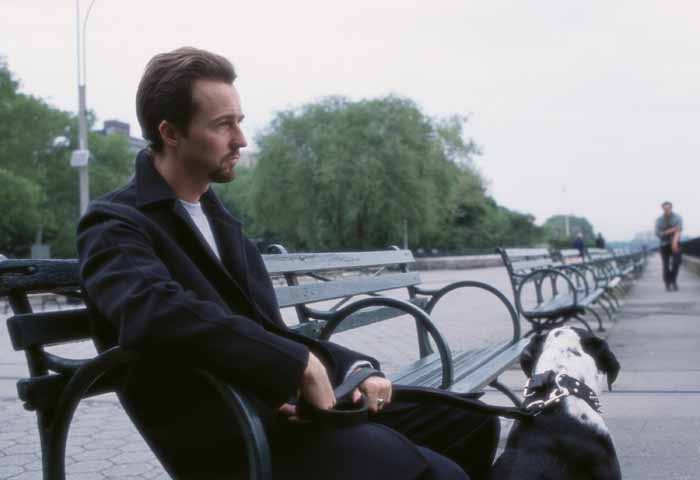
Over a long day of movie watching yesterday, I caught one of life’s strange yet serendipitously appropriate double features, The 25th Hour and Donnie Darko. While at first glance very different, both were excellent films dealing with some eerily similar themes – the fickleness of catastrophe and the fleeting nature of our relationships, for example – and involved similar protagonists, grappling with a fixed future, pondering choices made and opportunities lost. Together, they evoked a reflective melancholy that even xXx (really dumb, almost Gymkata-esque in its leaps of logic sometimes, but Vin Diesel is an out-and-out star, and he makes this tired stuff occasionally seem fresher than over in the Bond franchise) and Mean Machine (a disappointing and needless Lock Stock futbol update of The Longest Yard) couldn’t break.
I should probably say up front that I’m biased toward Spike Lee – With few exceptions, I’ve liked almost every one of his movies (and I also think he’s been on a roll of late, what with He Got Game, Summer of Sam, and Bamboozled.) As with Oliver Stone, I think people’s problems with Lee’s politics have unfairly undermined the reputation of a great director, so much so that he even has trouble getting funding for his pictures, which is ludicrous. A lot of critics seem to be faulting Spike for inserting 9/11 into this film, arguing that is was either ham-handed or unnecessary. I couldn’t disagree more. Not only did it make thematic sense (for example, when Monty [Ed Norton] Brogan’s friends steel themselves to have a blast on his last night and pretend “nothing is wrong”), but it perfectly captured the feeling of life in New York after the fall. Everyone’s trying to go on with their business and pretend to move on, and yet everywhere you look there are grim reminders of that day’s events, and somehow it’s all you end up talking about. And the last fifteen minutes of the film, which tread a very fine line between hokey and surprisingly touching, are a haunting representation of what was lost that day (and, Lee seems to suggest, what could be lost if further attacks necessitate a New York diaspora.) In effect, this is Lee’s ode to NYC’s magic and resilience, and I think there were very few other filmmakers that could have pulled this off. (And even fewer could have gotten so many nuances right, from the myriad details of Norton’s over-hyped mirror rant to Barry Pepper’s jackass of a boss having courtside Knicks tix.)
Speaking of which, all the performances are noteworthy, with Barry Pepper as a stand-out – he may have successfully shed the opprobium of Battlefield Earth with this performance. (As the schlub tied up in sexual knots, Phillip Seymour Hoffman has been down this road a couple of times now, but it still only seems like he’s repeating himself half the time.) The film has some problems, of course (the not-so-gripping denouement of the Pepper-Hoffman story seems ripped from another Norton movie – you’ll know what I mean when you see it), but well worth seeing if you get a chance.
Which brings us to Donnie Darko. It’s probably unfair to a film as unique and consistently surprising as Darko to force a comparison with 25th Hour, but that’s the way the day went (to say nothing of Farscape 4.12, which also felt strangely apropos, being about trying to avert death on the Challenger on an ’80’s Halloween night.) At any rate, a lot of blogs out there adore this film, and I now see what the fuss was about. Again, this movie also had problems (Drew Barrymore was noticeably worse than everyone else in the film, the Jim Cunningham sidestory was funny but a bit pat, and the payoff doesn’t quite live up to the riveting setup), but that’s missing the forest for the trees. All in all, this is a marvelously genre-bending film with wonderful anchoring performances by the Gyllenhaals. I think I liked this movie much more for not knowing a lot about it going in, so I won’t mention the particulars here. But it’s definitely worth seeing. Extra points for the soundtrack, which with “Head over Heels,” “Love will Tear Us Apart,” and “Under the Milky Way” (and the reworked “Mad World“- a nice surprise), reminded me more of my own high school experience than any other film I can remember. (The Dukakis era setting helped, since that was my own eighth grade year.)
All in all, two very rewarding film experiences. I was reminded of the night in high school when (while working at Blockbuster) I saw Glengarry Glen Ross, Reservoir Dogs, One False Move, and A Midnight Clear all for the first time on the same night. I love it when movie nights take on strange subtexts of their own (To force one, in a weird way, xXx and Mean Machine both dealt with the fear-of-prison undergirding The 25th Hour), and the two standout films last night have lent a rich and bittersweet minor key to the weekend.

